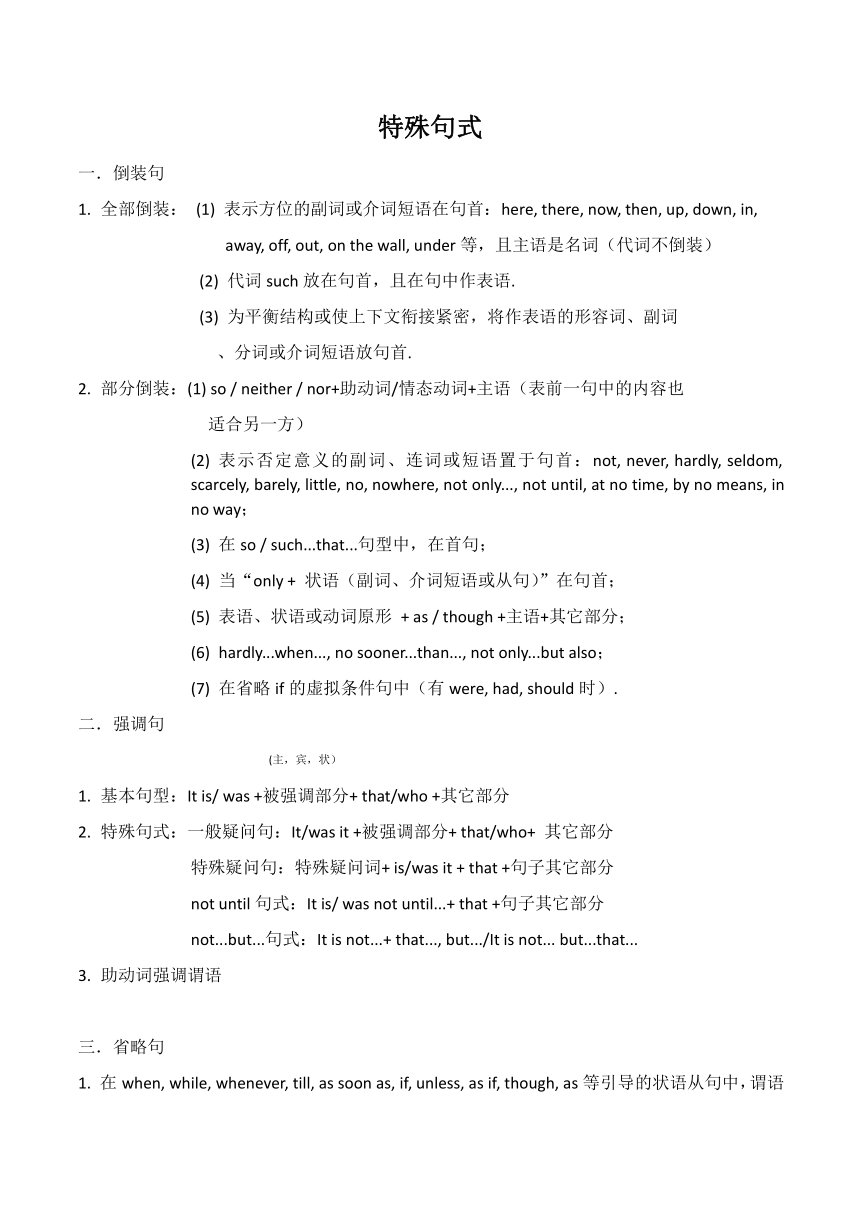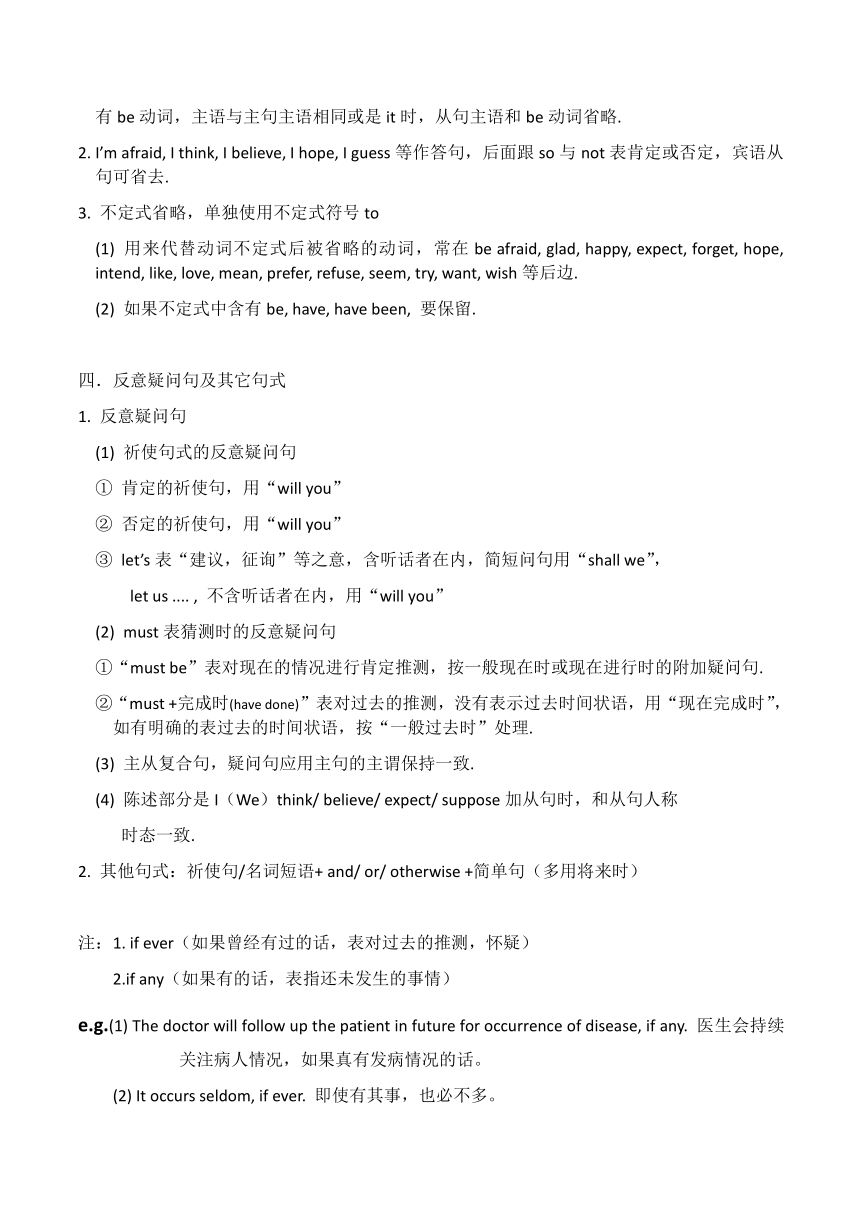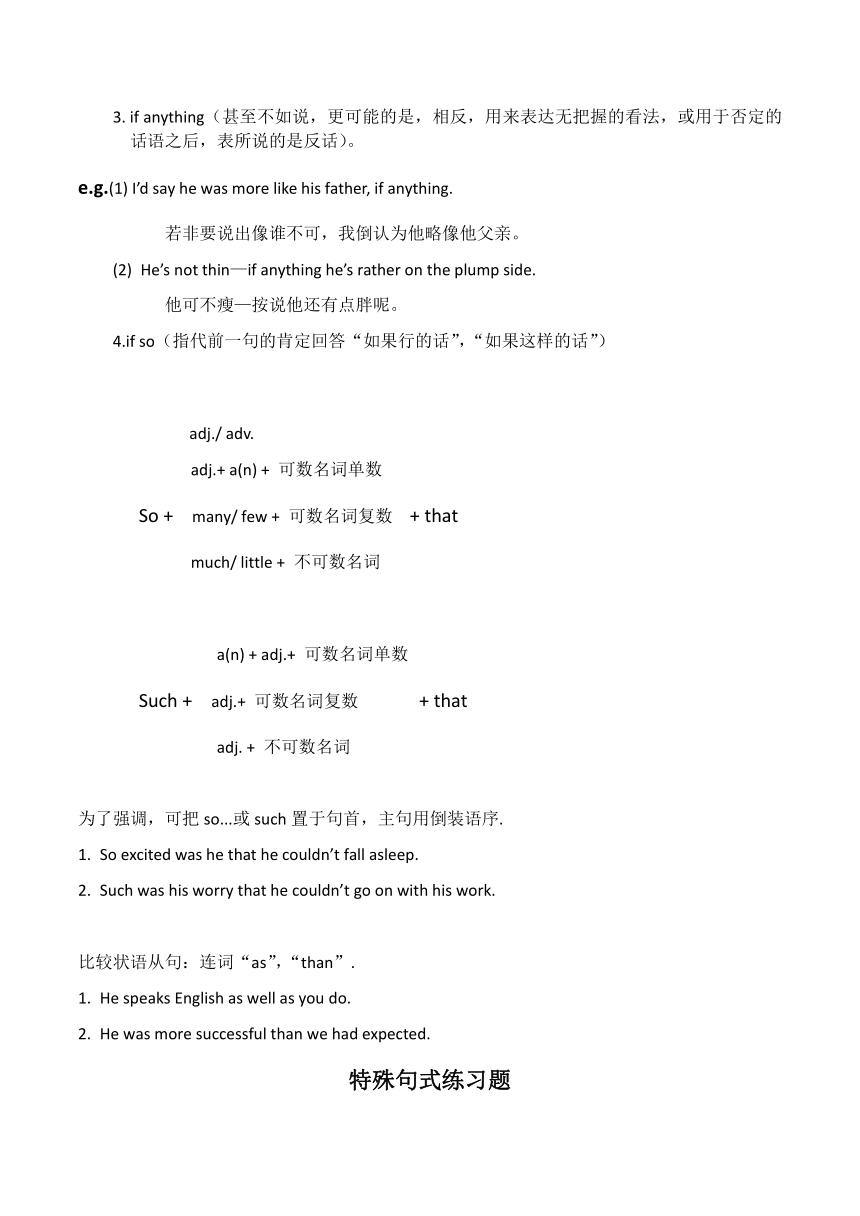高中英语特殊句式 导学案(含答案)-2025届高三英语复习专项
文档属性
| 名称 | 高中英语特殊句式 导学案(含答案)-2025届高三英语复习专项 |

|
|
| 格式 | docx | ||
| 文件大小 | 24.2KB | ||
| 资源类型 | 教案 | ||
| 版本资源 | 人教版(2019) | ||
| 科目 | 英语 | ||
| 更新时间 | 2025-02-11 22:18:52 | ||
图片预览



文档简介
特殊句式
倒装句
全部倒装: (1) 表示方位的副词或介词短语在句首:here, there, now, then, up, down, in,
away, off, out, on the wall, under等,且主语是名词(代词不倒装)
代词such放在句首,且在句中作表语.
为平衡结构或使上下文衔接紧密,将作表语的形容词、副词
、分词或介词短语放句首.
部分倒装:(1) so / neither / nor+助动词/情态动词+主语(表前一句中的内容也
适合另一方)
表示否定意义的副词、连词或短语置于句首:not, never, hardly, seldom, scarcely, barely, little, no, nowhere, not only..., not until, at no time, by no means, in no way;
在so / such...that...句型中,在首句;
当“only + 状语(副词、介词短语或从句)”在句首;
表语、状语或动词原形 + as / though +主语+其它部分;
hardly...when..., no sooner...than..., not only...but also;
在省略if的虚拟条件句中(有were, had, should时).
二.强调句
(主,宾,状)
基本句型:It is/ was +被强调部分+ that/who +其它部分
特殊句式:一般疑问句:It/was it +被强调部分+ that/who+ 其它部分
特殊疑问句:特殊疑问词+ is/was it + that +句子其它部分
not until句式:It is/ was not until...+ that +句子其它部分
not...but...句式:It is not...+ that..., but.../It is not... but...that...
助动词强调谓语
三.省略句
1. 在when, while, whenever, till, as soon as, if, unless, as if, though, as等引导的状语从句中,谓语有be动词,主语与主句主语相同或是it时,从句主语和be动词省略.
2. I’m afraid, I think, I believe, I hope, I guess等作答句,后面跟so与not表肯定或否定,宾语从句可省去.
3. 不定式省略,单独使用不定式符号to
(1) 用来代替动词不定式后被省略的动词,常在be afraid, glad, happy, expect, forget, hope, intend, like, love, mean, prefer, refuse, seem, try, want, wish等后边.
(2) 如果不定式中含有be, have, have been, 要保留.
反意疑问句及其它句式
反意疑问句
祈使句式的反意疑问句
① 肯定的祈使句,用“will you”
② 否定的祈使句,用“will you”
③ let’s表“建议,征询”等之意,含听话者在内,简短问句用“shall we”,
let us .... , 不含听话者在内,用“will you”
must表猜测时的反意疑问句
①“must be”表对现在的情况进行肯定推测,按一般现在时或现在进行时的附加疑问句.
②“must +完成时(have done)”表对过去的推测,没有表示过去时间状语,用“现在完成时”,如有明确的表过去的时间状语,按“一般过去时”处理.
主从复合句,疑问句应用主句的主谓保持一致.
陈述部分是I(We)think/ believe/ expect/ suppose加从句时,和从句人称
时态一致.
其他句式:祈使句/名词短语+ and/ or/ otherwise +简单句(多用将来时)
注:1. if ever(如果曾经有过的话,表对过去的推测,怀疑)
2.if any(如果有的话,表指还未发生的事情)
e.g.(1) The doctor will follow up the patient in future for occurrence of disease, if any. 医生会持续关注病人情况,如果真有发病情况的话。
(2) It occurs seldom, if ever. 即使有其事,也必不多。
3. if anything(甚至不如说,更可能的是,相反,用来表达无把握的看法,或用于否定的话语之后,表所说的是反话)。
e.g.(1) I’d say he was more like his father, if anything.
若非要说出像谁不可,我倒认为他略像他父亲。
He’s not thin—if anything he’s rather on the plump side.
他可不瘦—按说他还有点胖呢。
4.if so(指代前一句的肯定回答“如果行的话”,“如果这样的话”)
adj./ adv.
adj.+ a(n) + 可数名词单数
So + many/ few + 可数名词复数 + that
much/ little + 不可数名词
a(n) + adj.+ 可数名词单数
Such + adj.+ 可数名词复数 + that
adj. + 不可数名词
为了强调,可把so...或such置于句首,主句用倒装语序.
So excited was he that he couldn’t fall asleep.
Such was his worry that he couldn’t go on with his work.
比较状语从句:连词“as”,“than”.
He speaks English as well as you do.
He was more successful than we had expected.
特殊句式练习题
John opened the door. _______ _______ a girl he had never seen before.(那儿站着)
Just ______ ______ ______ ______ ______ ______ ______ ______ ______ , all covered with blood.(公交车前面躺着一个受伤的人)
Such ______ ______ ______ ; no one can deny them.(这些就是事实)
______ ______ ______ ______ were some scientists from China.(出席了会议)
______ ______ ______ .(他们走了。)
If Joe’s wife won’t go to the party, neither ______ ______ .(他也不去)
She has been to New York. So ______ ______ .(我也去过)
- It is too hot. - So _____ _____ .(是的,确实)
At no time ______ ______ ______ the first to use the nuclear weapon.(中国将)
In such a hurry _____ _____ _____ the office that he forgot to lock the door.(他离开)
_____ ______ I like it, I’ll not buy it.(尽管很)
_______ _______ he would, he might fail again.(尽管,尝试)
Hardly/ Scarcely _____ _____ _____ the news when he began to cry.(他听到)
_____ _____ _____ your lessons, you might have passed the examination.(要是你早复习了)
______ ______ ______ ______ , we would go for a picnic tomorrow.(要是明天不下雨)
It is not how much we do but how much love we put into what we do ______ benefits our work first.
Was it Tom _______ was to blame
The patient looks much better. What is it __________ has made him what he is today
It was not until midnight __________ we got home because of traffic jams.
He ________ come to see you last Sunday, but you were not.
If you have a job, ________ devote yourself to it and finally you will succeed.
I really don’t know where ______ ______ ______ I put my wallet after I paid the bill.
The experiment shows that proper amounts of exercise, if carried out regularly, can improve our health.(进行)
Get up early tomorrow, if _________ (you don’t get up early), you will miss the first bus.
- Do you think it will rain - I hope ________ (that it will not rain).
- Do you believe our team will win - I guess __________ .(会赢)
I asked him to see the film, but he didn’t want __________ .
- Are you a sailor - No, but I used to _________ .
When __________ (ask) questions in class, one should answer them as clearly as possible.
He is only too ready to help others, seldom, _______ _______ , refusing them when they turn to him.(如果曾经有的话)
Let’s go out for a walk after supper, ________ _________
He must be honest, _______ _______
It must have rained last night, ________ ________
He must have known the truth, ________ _________
He left in a hurry because there was no time left, ________ ________
I don’t think anyone can finish the experiment, _______ ________
“Only two centimeters higher, ________ you will break the world record.” encouraged the coach.
__________ (tell) your teacher the problem with learning, theoretically, and they will help you.
特殊句式
1.There stood 2.in front of the bus lies an injured man 3.are the facts 4.Present at the meeting
5.Away they went 6.will he 7.have I 8.it is 9.will China be 10.did he leave
11.Much as/though 12.Try as/though 13.had he heard 14.Had you reviewed
15.should it not rain 16.that 17.that/who 18.that 19.that 20.did 21.do 22.it was that
23.carried out 24.not 25.not 26.so 27.to 28.be 29.asked 30.if ever 31.Shall we
32.isn’t he 33.didn’t it 34.hasn’t he 35.didn’t he 36.can they 37.and 38. Tell
倒装句
全部倒装: (1) 表示方位的副词或介词短语在句首:here, there, now, then, up, down, in,
away, off, out, on the wall, under等,且主语是名词(代词不倒装)
代词such放在句首,且在句中作表语.
为平衡结构或使上下文衔接紧密,将作表语的形容词、副词
、分词或介词短语放句首.
部分倒装:(1) so / neither / nor+助动词/情态动词+主语(表前一句中的内容也
适合另一方)
表示否定意义的副词、连词或短语置于句首:not, never, hardly, seldom, scarcely, barely, little, no, nowhere, not only..., not until, at no time, by no means, in no way;
在so / such...that...句型中,在首句;
当“only + 状语(副词、介词短语或从句)”在句首;
表语、状语或动词原形 + as / though +主语+其它部分;
hardly...when..., no sooner...than..., not only...but also;
在省略if的虚拟条件句中(有were, had, should时).
二.强调句
(主,宾,状)
基本句型:It is/ was +被强调部分+ that/who +其它部分
特殊句式:一般疑问句:It/was it +被强调部分+ that/who+ 其它部分
特殊疑问句:特殊疑问词+ is/was it + that +句子其它部分
not until句式:It is/ was not until...+ that +句子其它部分
not...but...句式:It is not...+ that..., but.../It is not... but...that...
助动词强调谓语
三.省略句
1. 在when, while, whenever, till, as soon as, if, unless, as if, though, as等引导的状语从句中,谓语有be动词,主语与主句主语相同或是it时,从句主语和be动词省略.
2. I’m afraid, I think, I believe, I hope, I guess等作答句,后面跟so与not表肯定或否定,宾语从句可省去.
3. 不定式省略,单独使用不定式符号to
(1) 用来代替动词不定式后被省略的动词,常在be afraid, glad, happy, expect, forget, hope, intend, like, love, mean, prefer, refuse, seem, try, want, wish等后边.
(2) 如果不定式中含有be, have, have been, 要保留.
反意疑问句及其它句式
反意疑问句
祈使句式的反意疑问句
① 肯定的祈使句,用“will you”
② 否定的祈使句,用“will you”
③ let’s表“建议,征询”等之意,含听话者在内,简短问句用“shall we”,
let us .... , 不含听话者在内,用“will you”
must表猜测时的反意疑问句
①“must be”表对现在的情况进行肯定推测,按一般现在时或现在进行时的附加疑问句.
②“must +完成时(have done)”表对过去的推测,没有表示过去时间状语,用“现在完成时”,如有明确的表过去的时间状语,按“一般过去时”处理.
主从复合句,疑问句应用主句的主谓保持一致.
陈述部分是I(We)think/ believe/ expect/ suppose加从句时,和从句人称
时态一致.
其他句式:祈使句/名词短语+ and/ or/ otherwise +简单句(多用将来时)
注:1. if ever(如果曾经有过的话,表对过去的推测,怀疑)
2.if any(如果有的话,表指还未发生的事情)
e.g.(1) The doctor will follow up the patient in future for occurrence of disease, if any. 医生会持续关注病人情况,如果真有发病情况的话。
(2) It occurs seldom, if ever. 即使有其事,也必不多。
3. if anything(甚至不如说,更可能的是,相反,用来表达无把握的看法,或用于否定的话语之后,表所说的是反话)。
e.g.(1) I’d say he was more like his father, if anything.
若非要说出像谁不可,我倒认为他略像他父亲。
He’s not thin—if anything he’s rather on the plump side.
他可不瘦—按说他还有点胖呢。
4.if so(指代前一句的肯定回答“如果行的话”,“如果这样的话”)
adj./ adv.
adj.+ a(n) + 可数名词单数
So + many/ few + 可数名词复数 + that
much/ little + 不可数名词
a(n) + adj.+ 可数名词单数
Such + adj.+ 可数名词复数 + that
adj. + 不可数名词
为了强调,可把so...或such置于句首,主句用倒装语序.
So excited was he that he couldn’t fall asleep.
Such was his worry that he couldn’t go on with his work.
比较状语从句:连词“as”,“than”.
He speaks English as well as you do.
He was more successful than we had expected.
特殊句式练习题
John opened the door. _______ _______ a girl he had never seen before.(那儿站着)
Just ______ ______ ______ ______ ______ ______ ______ ______ ______ , all covered with blood.(公交车前面躺着一个受伤的人)
Such ______ ______ ______ ; no one can deny them.(这些就是事实)
______ ______ ______ ______ were some scientists from China.(出席了会议)
______ ______ ______ .(他们走了。)
If Joe’s wife won’t go to the party, neither ______ ______ .(他也不去)
She has been to New York. So ______ ______ .(我也去过)
- It is too hot. - So _____ _____ .(是的,确实)
At no time ______ ______ ______ the first to use the nuclear weapon.(中国将)
In such a hurry _____ _____ _____ the office that he forgot to lock the door.(他离开)
_____ ______ I like it, I’ll not buy it.(尽管很)
_______ _______ he would, he might fail again.(尽管,尝试)
Hardly/ Scarcely _____ _____ _____ the news when he began to cry.(他听到)
_____ _____ _____ your lessons, you might have passed the examination.(要是你早复习了)
______ ______ ______ ______ , we would go for a picnic tomorrow.(要是明天不下雨)
It is not how much we do but how much love we put into what we do ______ benefits our work first.
Was it Tom _______ was to blame
The patient looks much better. What is it __________ has made him what he is today
It was not until midnight __________ we got home because of traffic jams.
He ________ come to see you last Sunday, but you were not.
If you have a job, ________ devote yourself to it and finally you will succeed.
I really don’t know where ______ ______ ______ I put my wallet after I paid the bill.
The experiment shows that proper amounts of exercise, if carried out regularly, can improve our health.(进行)
Get up early tomorrow, if _________ (you don’t get up early), you will miss the first bus.
- Do you think it will rain - I hope ________ (that it will not rain).
- Do you believe our team will win - I guess __________ .(会赢)
I asked him to see the film, but he didn’t want __________ .
- Are you a sailor - No, but I used to _________ .
When __________ (ask) questions in class, one should answer them as clearly as possible.
He is only too ready to help others, seldom, _______ _______ , refusing them when they turn to him.(如果曾经有的话)
Let’s go out for a walk after supper, ________ _________
He must be honest, _______ _______
It must have rained last night, ________ ________
He must have known the truth, ________ _________
He left in a hurry because there was no time left, ________ ________
I don’t think anyone can finish the experiment, _______ ________
“Only two centimeters higher, ________ you will break the world record.” encouraged the coach.
__________ (tell) your teacher the problem with learning, theoretically, and they will help you.
特殊句式
1.There stood 2.in front of the bus lies an injured man 3.are the facts 4.Present at the meeting
5.Away they went 6.will he 7.have I 8.it is 9.will China be 10.did he leave
11.Much as/though 12.Try as/though 13.had he heard 14.Had you reviewed
15.should it not rain 16.that 17.that/who 18.that 19.that 20.did 21.do 22.it was that
23.carried out 24.not 25.not 26.so 27.to 28.be 29.asked 30.if ever 31.Shall we
32.isn’t he 33.didn’t it 34.hasn’t he 35.didn’t he 36.can they 37.and 38. Tell
